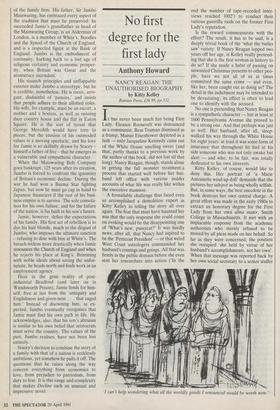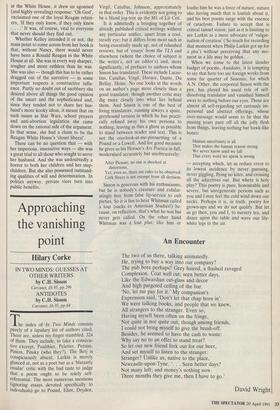No first degree for the first lady
Anthony Howard
NANCY REAGAN: THE UNAUTHORISED BIOGRAPHY by Kitty Kelley
Bantam Press, £16.99, pp.532
It has never been much fun being First Lady. Eleanor Roosevelt was denounced as a communist, Bess Truman dismissed as a frump, Mamie Eisenhower depicted as a lush — only Jacqueline Kennedy came out of the White House smelling sweet (and that, partly thanks to a previous work by the author of this book, did not last all that long). Nancy Reagan, though, stands alone in getting the full monster treatment,a process that started well before her hus- band left office with various insider accounts of what life was really like within the executive mansion.
A formidable challenge thus faced even so accomplished a demolition expert as Kitty Kelley in telling the story all over again. The fear that must have haunted her was that the only response she could count on evoking would be the disappointing one of 'What's new, pussycat?' It was hardly news, after all, that Nancy had aspired to be the 'Petticoat President' — or that weird West Coast astrologers commanded her husband's comings and goings. All that was firmly in the public domain before she even sent her researchers into action ('In the end the number of tape-recorded inter- views reached 1002') to conduct their various guerrilla raids on the former First Lady's reputation.
Is the reward commensurate with the effort? The result, it has to be said, is a deeply trivial book of the 'what the butler saw' variety. If Nancy Reagan lopped two years off her age, is Kelley really pretend- ing that she is the first woman in history to do so? If she made a habit of passing on unwanted Christmas presents to other peo- ple, have we not all of us at times committed the same crime — and even, like her, been caught out in doing so? The detail in the indictment may be intended to be devastating; its effect is often to lead one to identify with the accused.
No one is pretending that Nancy Reagan is a sympathetic character — but at least at 1600 Pennsylvania Avenue she proved to be a strong one. And that perhaps was just as well. Her husband, after all, sleep- walked his way through the White House for eight years: at least it was some form of insurance that throughout he had at his side someone who was not only awake but alert — and who, to be fair, was totally dedicated to his own interests.
Kitty Kelley, of course, would like to deny this. Her portrait of 'a Marie Antoinette wind-up doll' demands that she pictures her subject as being wholly selfish. But, in some ways, the best anecdote in the book destroys her own central charge. A great effort was made in the early 1980s to extract an honorary degree for the First Lady from her own alma mater, Smith College in Massachusetts. It met with an implacable response from the academic authorities who sternly refused to be moved by all pleas made on her behalf. So far as they were concerned, the position she occupied 'she held by virtue of her husband's accomplishments, not her own'. When that message was reported back by her own social secretary to a senior staffer can't help wondering what all the vsorldly goods 1 renounced would be worth now.' at the White House, it drew an agonised (and highly revealing) response: 'Oh God', exclaimed one of the loyal Reagan retain- ers, 'If they only knew, if they only knew . . . .' It was, of course, vital to everyone that never should they find out.
Whether Kelley intended it or not, the main point to come across from her book is that, without Nancy, there would never have been a Ronald Reagan in the White House at all. She was in every way sharper, tougher and more ruthless than he was. She was also — though this has to be rather dragged out of the narrative — in some important respects a constructive influ- ence. Partly no doubt out of snobbery she desired above all things the good opinion of the smart and the sophisticated and, since they tended not to share her hus- band's more kooky ideas, it meant that on such issues as Star Wars, school prayers and anti-abortion legislation she came down on the rational side of the argument. In that sense, she had a claim to be the Reagan White House's 'closet liberal'.
There can be no question that — with her imperious, insensitive ways — she was a great trial to all those who sought to serve her husband. And she was undoubtedly a horror to both her children and her step- children. But she also possessed outstand- ing qualities of will and determination. In politics anyway, private vices turn into public benefits.



























































 Previous page
Previous page